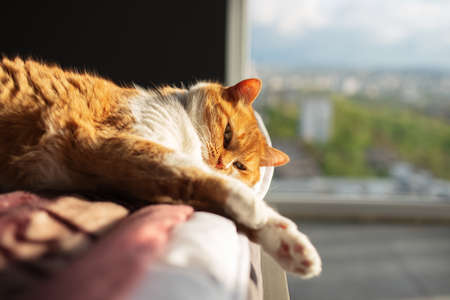Understanding Your Cat’s Natural Sleep Patterns
Cats are famous for their love of sleep, but what does healthy feline sleep actually look like? Knowing your cat’s natural sleep habits can help you spot when something isn’t quite right. Here’s a guide to understanding how and why cats in American households snooze the way they do.
Typical Sleep Durations
It’s normal for adult cats to sleep anywhere from 12 to 16 hours per day, with some especially lazy felines clocking up closer to 20 hours! Kittens and senior cats often need even more rest. If you notice your cat sleeping significantly less—or much more—than these averages, it could be a sign that something’s off.
| Cat Age | Average Daily Sleep (hours) |
|---|---|
| Kitten (up to 6 months) | 16-20 |
| Adult (1-7 years) | 12-16 |
| Senior (8+ years) | 14-20 |
Cat Sleep Cycles
Cats experience both light and deep sleep cycles. Light sleep allows them to stay alert to their environment—a throwback to their wild instincts—while deep sleep is when real rest and body repair happen. You’ll often see your cat twitching their whiskers or paws during deep REM (rapid eye movement) sleep.
Common Cat Sleeping Behaviors in American Homes
- Napping throughout the day: Cats are crepuscular, meaning they’re most active at dawn and dusk. Expect them to nap on and off all day long.
- Changing favorite spots: Whether it’s a sunny window, cozy blanket, or your laundry basket, cats love rotating their sleeping locations.
- Curled up or stretched out: Both positions are normal. A curled-up cat may want warmth or security, while a sprawled-out kitty is likely feeling safe and relaxed.
- Kneading and purring before sleep: Many cats knead soft surfaces and purr as a comfort routine before settling down.
- Snoozing near family members: In American households, cats often seek out people or other pets they trust for company during naps.
What Does Healthy Cat Sleep Look Like?
- Your cat falls asleep easily in familiar places.
- Their sleep is undisturbed by frequent waking or restlessness.
- You notice regular periods of deep relaxation (twitching, slow breathing).
- Their overall mood and energy seem normal when awake.
If your cat’s sleeping habits don’t match these patterns, it might be time to take a closer look at their health or environment in the next section.
2. Recognizing the Signs of Poor Sleep in Cats
Just like people, cats need good sleep to stay healthy and happy. When your cat isn’t getting enough rest, it can show up in different ways—sometimes it’s obvious, but other times it’s more subtle. By knowing what to look for, you can help your furry friend get back on track.
Common Behavioral Signs
Cats are creatures of habit. When their sleep is off, you might notice changes in how they act during the day or night. Here are some key behavioral signs that could mean your cat isn’t sleeping well:
| Sign | What It Looks Like |
|---|---|
| Irritability | Your cat may seem grumpy, lash out with swats or hisses, or avoid being touched when they’re usually friendly. |
| Excessive Meowing at Night | You might hear your cat vocalizing more than usual, especially after bedtime, as if trying to get your attention. |
| Restlessness | Pacing around the house, jumping on and off furniture, or switching spots frequently during the night. |
| Clinginess or Withdrawal | Some cats become extra needy, while others hide more often than usual. |
Physical Clues That Your Cat Isn’t Resting Well
Along with changes in behavior, there can be physical signs that point to poor sleep:
- Changes in Nap Patterns: Sleeping less during the day, or taking very short naps instead of deep, restful ones.
- Tired Appearance: Your cat might look droopy-eyed or less alert than normal.
- Lack of Grooming: Cats who don’t feel rested may neglect their grooming routine and start to look a little scruffy.
- Lethargy: Sleeping too much can also be a sign—if your cat seems unusually sluggish even after napping, something could be off.
When to Pay Extra Attention
If you notice these changes lasting more than a few days, it’s time to dig a bit deeper. Sometimes sleep issues are caused by stress (like a new pet or moving), but they can also be linked to health problems. Keeping an eye out for these signs helps you catch potential issues early and get your cat the care they need.

3. Common Causes of Disrupted Cat Sleep
Cats are known for loving their sleep, but sometimes things can get in the way of a good catnap. If you notice your feline friend isn’t resting as well as usual, it might be due to some common issues that many American pet owners face. Here’s a breakdown of what might be disturbing your cat’s sleep and how you can recognize the signs.
Household Changes and Stress
Cats thrive on routine, so any big changes at home—like moving, welcoming a new baby or pet, or even rearranging the furniture—can leave them feeling anxious and restless at night. They might pace around, meow more than usual, or seem jumpy during bedtime hours.
Noisy Environments
Loud noises from traffic, construction, or household appliances can keep your cat from getting deep, restful sleep. Even nighttime sounds like a running dishwasher or late-night TV can make sensitive cats feel unsettled.
Health Problems
Sometimes disrupted sleep is linked to underlying health concerns. Issues such as arthritis, hyperthyroidism, urinary tract infections, or even dental pain can make it hard for your cat to settle down comfortably.
Common Health Issues That Affect Cat Sleep
| Health Issue | Possible Signs |
|---|---|
| Arthritis | Difficulty jumping, stiff movements |
| Hyperthyroidism | Increased activity at night, weight loss |
| Urinary Tract Infection | Frequent trips to the litter box, vocalizing |
| Dental Pain | Pawing at mouth, eating less |
Lack of Stimulation During the Day
If your cat spends most of the day alone or doesn’t have enough toys or playtime, they may not use up their energy and could become restless at night. This is especially common for indoor cats who don’t get much opportunity to hunt or explore.
Quick Tips to Help Your Cat Sleep Better:
- Keep a consistent daily routine for feeding and playtime.
- Create cozy sleeping spots away from noise and foot traffic.
- Offer interactive toys and climbing trees to keep your cat active during the day.
- If you suspect health problems, schedule a check-up with your vet.
4. How Poor Sleep Can Affect Your Cat’s Health
Cats are famous for their love of sleep, often snoozing 12-16 hours a day. But just like people, cats need quality rest—not just time spent lying down. When your cat doesn’t get enough good sleep, it can impact both their body and mind in ways you might not expect.
Physical Effects of Poor Sleep
Lack of proper rest can lead to several physical problems for your cat. Here’s how insufficient sleep may show up in their health:
| Health Area | Possible Issues |
|---|---|
| Immune System | More likely to catch infections or get sick more often |
| Weight & Appetite | May eat less or gain/lose weight unexpectedly |
| Energy Levels | Seems tired during the day, reluctant to play or move |
| Grooming Habits | Might stop grooming as much, leading to messy fur |
Emotional and Behavioral Changes
Poor sleep doesn’t just affect your cat’s body—it impacts their mood and behavior, too. Cats that aren’t sleeping well might:
- Become more anxious or jumpy than usual
- Hide more often or act withdrawn from family members
- Lash out or seem irritable when touched or approached
- Vocalize (meow) excessively at night or during the day
- Have trouble using the litter box properly due to stress or confusion
The Sleep-Stress Cycle
Cats who are stressed may sleep poorly, but poor sleep can also make them more stressed. This cycle can be hard to break without making changes to your cat’s environment or routine.
Why Quality Sleep Matters for Cats of All Ages
Kittens, adult cats, and seniors all need restful sleep to support healthy growth, immune function, and emotional stability. If you notice changes in your cat’s energy, behavior, or health, consider whether they’re getting the sleep they need.
5. Tips to Help Your Cat Get Better Sleep
Create a Cozy Sleeping Space
Cats love comfort and security when they sleep. In the U.S., it’s common for pet parents to set up a designated cat bed or a soft blanket in a quiet, draft-free spot. Make sure your cat has a cozy nook away from high-traffic areas. If your home gets chilly, consider a heated cat bed, especially for older cats who might appreciate extra warmth.
Stick to a Consistent Routine
Cats are creatures of habit and feel most comfortable with regular routines. Try to feed, play with, and settle your cat down at similar times each day. This helps signal to your cat when it’s time to be active and when it’s time to wind down for rest.
Manage Playtime and Enrichment
American pet owners often use interactive toys—like feather wands or laser pointers—to help their cats burn off energy during the day. Providing enough mental and physical stimulation can prevent nighttime zoomies that disrupt everyone’s sleep. Aim for short play sessions in the evening before bedtime so your kitty is ready to snooze instead of run laps at midnight.
| Activity | Best Time | Purpose |
|---|---|---|
| Feeding | Morning & Evening | Establishes routine, prevents hunger at night |
| Playtime | Late Afternoon/Early Evening | Burns energy before bedtime |
| Cuddle/Quiet Time | Before Bedtime | Helps relax your cat for sleep |
Limit Nighttime Disruptions
If your cat is waking you up at night, try closing bedroom doors or using white noise machines to block out sounds that could trigger curiosity. Some American families invest in automatic feeders for late-night snacks if their cats get hungry and restless after dark.
When to Consult Your Veterinarian
If you’ve tried these tips and your cat still isn’t sleeping well—or if you notice signs like loud snoring, difficulty breathing, excessive restlessness, or sudden changes in sleep patterns—it’s time to call your vet. Sometimes poor sleep can be linked to health issues like arthritis, anxiety, or even hyperthyroidism. A professional checkup can help rule out any underlying problems and keep your kitty healthy and happy.

